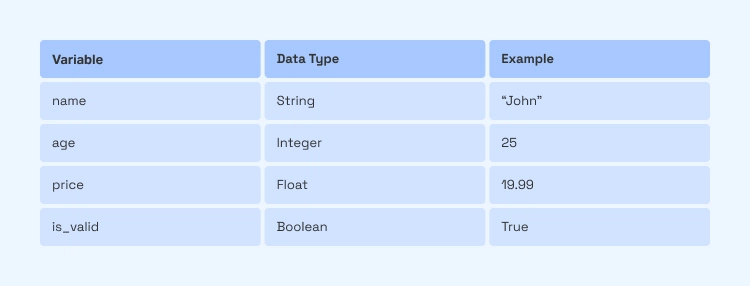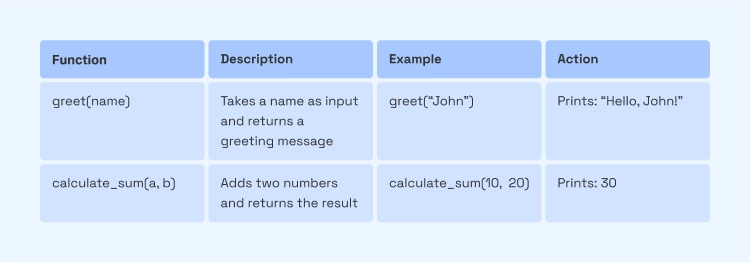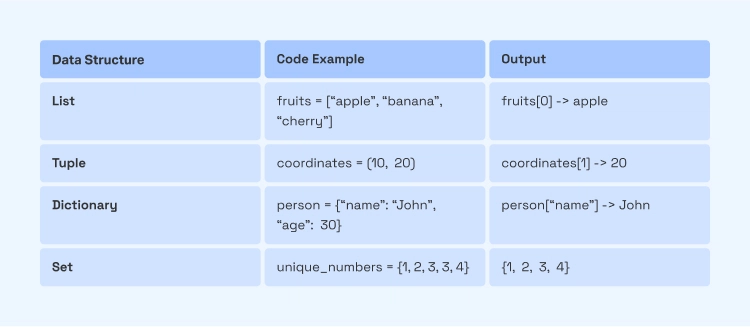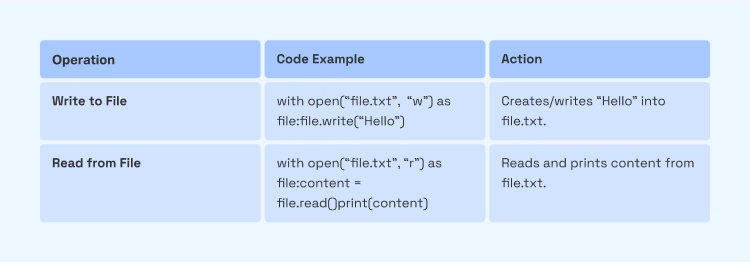In our previous blog, 4 Reasons Why You Should Learn Python, we highlighted how Python’s beginner-friendly nature and versatility make it a top choice for programmers and AI developers alike. Its wide-ranging applications in data science, artificial intelligence, machine learning, game development, and web development are just a few reasons many favoured it in the tech industry.
As Forbes points out, Python’s rise to prominence is primarily due to its simplicity and the thriving ecosystem of libraries that accelerate development in areas like AI and machine learning. Forbes also emphasises that Python’s strength lies in its active community and its use by companies such as Google, Netflix, and Spotify. This solidifies Python as a valuable language for professionals and those aspiring to switch to tech careers.
By diving into Python programming fundamentals, you’ll build a strong foundation, giving you the confidence to pursue your desired career path and apply your Python skills in high-demand industries.
Related: Quickest Way to Learn Python: 8 Tips for Learning Python Fast
Building a Strong Foundation with These 7 Python Fundamentals
Mastering Python’s core building blocks is essential to harnessing its power. These seven fundamental concepts form the backbone of Python programming and will equip you with the skills to tackle real-world problems.

1. The Building Blocks: Understanding Variables and Data Types
In Python, variables are like containers that store information. You can think of them as labels for data. For example, if you want to store a name, you would use a string (text), while for a number, you might use an integer or a float (decimal). Python makes it easy to handle different data types, such as:

Variable,Data Type,Example
name,String,"John"
age,Integer,25
price,Float,19.99
is_valid,Boolean,TrueUnderstanding how to use variables and data types properly is critical to writing efficient and clear code. For example, you might use variables to store and manipulate large datasets in data science. In web development, they help manage user input and data processing.
2. Steering the Code: Navigating Control Flow with Conditional Statements
Conditional statements in Python, such as if, elif, and else, help your program make decisions. Think of them as the “steering wheel” of your code—letting you control the program’s direction based on different conditions. For example:

age = 16
if age >= 18:
print("You're an adult")
elif age >= 13:
print("You're a teenager")
else:
print("You're a child")Here, the program checks the condition (age) and decides what action to take based on the result.
Control flow is essential in automation and dynamic applications, where the program needs to adapt to different inputs or scenarios.
3. Repeating with Purpose: Harnessing Loops to Automate Tasks
Loops in Python are essential for handling repetitive tasks efficiently. They allow you to run the same block of code multiple times without rewriting it. Python offers two main types of loops: for loops and while loops.

- For Loops: Used when you know how many times you want the loop to run. For example, looping through a list of items:
fruits = ["apple", "banana", "cherry"]
for fruit in fruits:
print(fruit)This will print each fruit in the list.
- While Loops: Used when you want the loop to keep running until a condition is met:
count = 1
while count <= 3:
print(count)
count += 1This will print 1, 2, and 3 as long as the condition count <= 3 is true.
Loops are handy for automating data manipulation, web scraping, and file handling. For instance, you can use a loop to process thousands of rows in a dataset or scrape multiple web pages without manually repeating the process.
4. Powering Your Code: The Flexibility of Functions
Functions in Python are reusable blocks of code that allow you to organise tasks efficiently. They simplify your programs by enabling you to write code once and reuse it whenever needed. Instead of rewriting code for similar tasks, you can define a function once and use it across different parts of your program. This makes your code more organised, efficient, and easier to manage.
- Code Organisation and Reusability: Functions help prevent code repetition by encapsulating tasks. You can define a function once and call it multiple times.
- Collaboration and Debugging: Functions break down complex programs, making debugging easier and collaboration smoother by dividing work into manageable parts.
For Example:

def greet(name):
return f"Hello, {name}!"
print(greet("John"))This function takes a name as input and returns a greeting, simplifying repetitive tasks like personalised messages.
5. Organising Data Efficiently: A Guide to Lists, Tuples, Dictionaries, and Sets
In Python, data structures are used to store and organise data collections. Choosing the right data structure depends on how you want to store, access, and manipulate data. Python offers four main types of data structures:

- Lists: Lists are ordered and mutable, meaning you can change the items within them. They’re great for storing a sequence of items that might need modification.
fruits = ["apple", "banana", "cherry"]
print(fruits[0]) #Output: apple- Tuples: Tuples are similar to lists but immutable, meaning their values cannot be changed once created. Tuples are useful when you want to ensure that the data remains constant.
coordinates = (10, 20)
print(coordinates[1]) #Output: 20
- Dictionaries: Dictionaries store data in key-value pairs, allowing quick access to values based on a unique key. This is especially useful when you need to label your data.
person = {"name": "Jonh", "age": 30}
print(person["name"])- Sets: Sets are unordered collections of unique items, making them useful for storing items without duplicates. They are commonly used for operations involving comparison and membership testing.
unique_numbers = {1, 2, 3, 3, 4}
print(unique_numbers) #Output: {1, 2, 3, 4}6. Managing Data with Ease: Understanding File Handling in Python
File handling in Python allows you to read from and write to files, making it an essential tool for managing and automating data storage. Whether working with simple text files, CSVs, or even more complex data formats, file handling makes processing and storing information easier.
- Reading from and Writing to Files: Python offers built-in functions for opening, reading, writing, and closing files. This allows you to work directly with file content in your program.

#Writing to a file
with open("example.txt", "w") as file:
file.write("Hello, World!")
#Reading from a file
with open("example.txt", "r") as file:
content = file.read()
print(content)File handling is crucial for automation, logging, and managing large datasets. Automating file operations means handling vast amounts of data with minimal manual effort. Whether saving logs or processing user data, file handling ensures that important information is stored and retrieved efficiently. In data analytics, you often work with CSV files to store and manipulate data, while in web development, file handling is vital for interacting with APIs or managing uploaded files.
7. Keeping Your Code Safe: Handling Errors with Try and Except
Error handling in Python allows you to deal with exceptions (unexpected errors) that may arise while your code is running. You can catch and handle these errors gracefully using the try and except blocks, ensuring your program doesn’t crash unexpectedly.
- Introduction to Handling Exceptions: In Python, when an error occurs during the execution of a program, it raises an exception. The try block lets you test a block of code, and if an error occurs, the except block catches it and allows you to handle it.

try:
number = int(input("Enter a number: "))
except ZeroDivisionError:
print("You can't divide by zero!")
except ValueError
print("Please enter a valid number")Writing robust code means anticipating and handling potential errors, ensuring your program runs smoothly even when something goes wrong. This is crucial for providing a seamless user experience and ensuring your program doesn’t crash in production environments. Error handling is used in web applications to manage incorrect user inputs, data processing scripts to handle file errors, and APIs to respond to client requests without failing when something goes wrong.
Conclusion
Acquiring a strong command of these Python fundamentals is important for individuals seeking to enter the tech industry or advance their careers. Whether you’re aspiring to become a data scientist, web developer, or AI engineer, these core concepts lay the groundwork for honing programming skills and instil the confidence necessary to tackle increasingly complex challenges.
To continue your Python journey, consider enrolling in a course or joining a community of learners to develop your skills. Vertical Institute offers Data Science and AI-integrated courses, providing hands-on experience and real-world applications to enhance learning. With practice and dedication, these Python fundamentals will open doors to exciting opportunities in high-demand tech roles.
Related: Why A Python Certification Is Necessary For Your Career
About Vertical Institute
Vertical Institute prepares individuals for the jobs of tomorrow. We specialise in teaching in-demand skills to build the next generation of changemakers and inventors through our world-class courses and certifications.
Singaporeans and PRs can receive up to 70% of IBF Funding off their course fees with Vertical Institute. The remaining costs can be claimable with NTUC UTAP Funding or SkillsFuture Credits. We support graduates of our programmes through our job placement assistance (JPA), connecting them to over 1,000 hiring partners. Vertical Institute facilitates internships and career opportunities, enabling you to put your new skills into practice.



